Check out Ideas from Buffer →
Some of my favorite tools posts end up being the ones where people share the specific tools they use to get jobs done.
There’s power in knowing the tools that others find useful and important enough to make part of their regular workflow.
For content marketing, I seem to take a particularly keen interest because I’m always on the hunt for new and amazing products to try, and I also appreciate a thoughtful recommendation. When it comes to the tools we use for content marketing at Buffer—a topic we’ve yet to discuss in too much detail on the blog, until now!—I feel that we keep things quite lean. And we’re constantly learning from others about new and exciting ways to get more done in the same amount of time.
So I’ve done my best to collect all my learnings here in this post, both with the tools we use to do content marketing at Buffer and the most highly-recommended tools from others in the industry. I’d love to know which ones are your favorites, too!
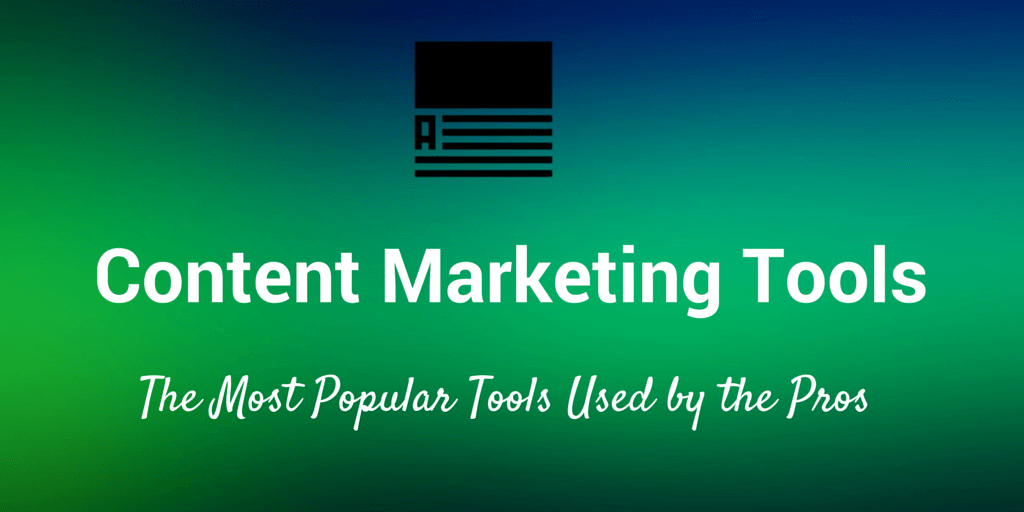
The 8 content marketing tools we use at Buffer
1. Trello for organization
Our main idea board and content calendar, Trello is where we find ourselves organizing our weeks ahead and storing potential blog posts full of notes, links, comments, and more.
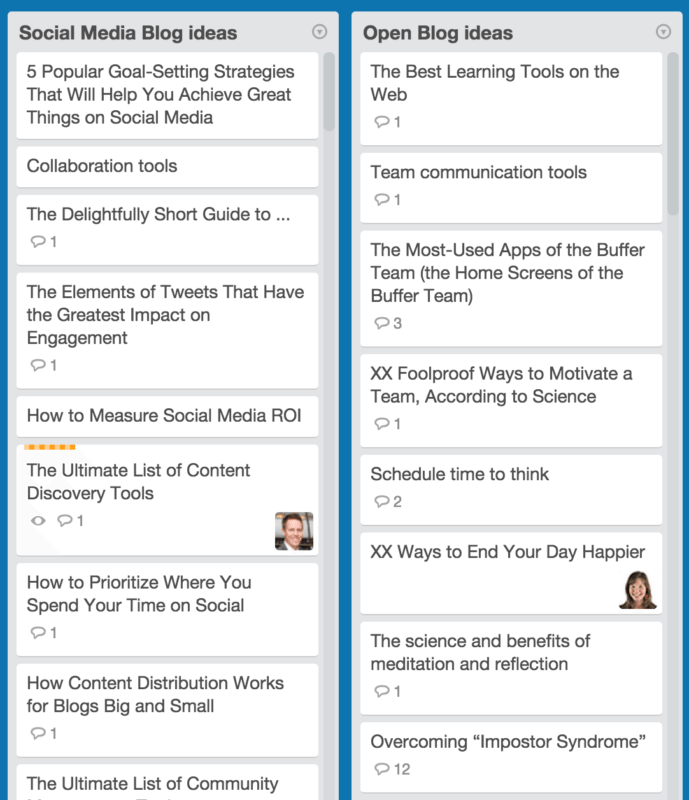
One neat feature we’ve yet to fully explore here is the potential of voting on Trello cards. A neat way to use this might be to ask for feedback and input from the whole team on which blog post ideas seem to resonate. The ones with the most votes move on to the writing stage!
2. WordPress for blogging
I sometimes forget to think of WordPress in terms of a tool. It feels like so much more!
Still, it’s the tool that I use on a daily basis to compose and publish all the articles that appear on the blog. The Buffer blogs run on WordPress, and we feel very grateful for such a robust platform that allows us the flexibility to easily edit the design and to experiment with different plugins in a snap.
3. Buffer for distribution
At the core a social media management tool, Buffer has been useful for us in several content-oriented ways:
- We use it to A/B test headlines by tweeting two different variations, comparing the stats, and going with the winner.
- We use it to test out content ideas. We share a blog post multiple times and in multiple ways. If a particular element of a blog post performs well on social media, we might explore the topic further in a more detailed and fine-tuned article.

4. Hipchat + Zapier for community-building
For keeping track of new comments on our articles, we’ve put together an automation workflow with Zapier that pulls in all new comments into our content chat room in Hipchat.

5. Canva for image creation
The majority of the images we create for blog posts come through screen capture or from Canva. In Canva, we build images based on their simple-to-use templates or with basic templates we’ve created before. It’s easy to copy over an existing image and tweak and adjust small things for each new post.
6. MailChimp for emailing
We’ve built our RSS email list using MailChimp, which we’ve found quite intuitive for easiliy creating automated RSS campaigns as well as weekly digests. The next step for us here is segmenting the list so that the emails we send are of the optimum relevance to those who receive them!
7. Google Analytics for traffic stats
The most widely used website analytics tool out there, Google Analytics gives us all the information we may ever need for figuring out what’s working well with our blog content. A few of our favorite reports include
- Time on page
- Social media sources
- Search queries
- New vs. returning visitors
- Referrals
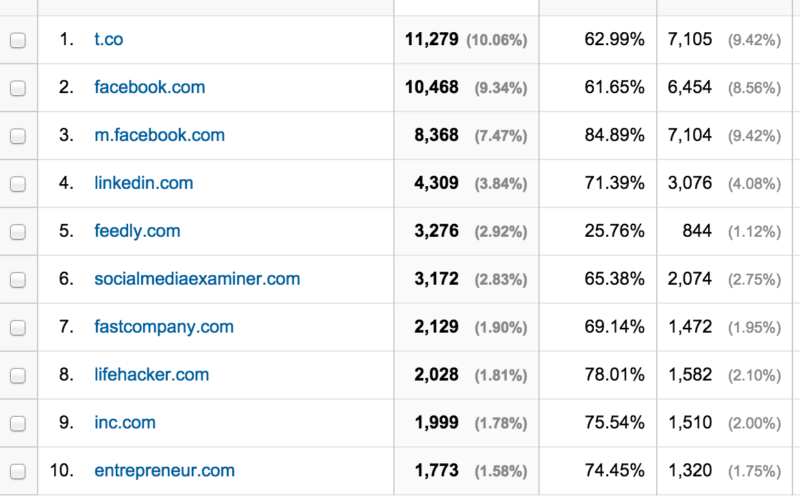
8. Feedly for content ideas
Our idea curation process involves reading as many great blogs as we can. Feedly makes this possible. We subscribe to feeds for a huge number of blogs and get ideas and inspiration from the types of headlines and topics we see.

If you’re at all interested, you can subscribe here to my current list of Feedly favorites.
Content marketing tools used by the pros
The above short list of tools represents the ones we use most often at Buffer. It’s far from a complete list of what’s out there. Many other bloggers and content creators have found great benefit from a number of other tools. Here are some that get mentioned most often by pro bloggers.
For a complete list of other tools, you might consider checking out some of the helpful lists put together by KISSmetrics and the Content Marketing Forum and QuickSprout.
Analytics

Perhaps the biggest draw of services like Chartbeat, GoSquared, and MixPanel is the simplicity of the data compared to tools like Google Analytics. These alternative analytics tools tend to focus on real-time information, social media shares, and simple dashboards.
Baremetrics founder and blogger Josh Pigford explains the benefits he gets from GoSquared (pictured above).
Real-time traffic data. A lot easier to find out where traffic is coming from than Google Analytics. I use this quite a lot when we publish a new blog post or send out a newsletter to get a feel for where traffic is coming from and how a given item is being shared throughout the day.
All-in-one services
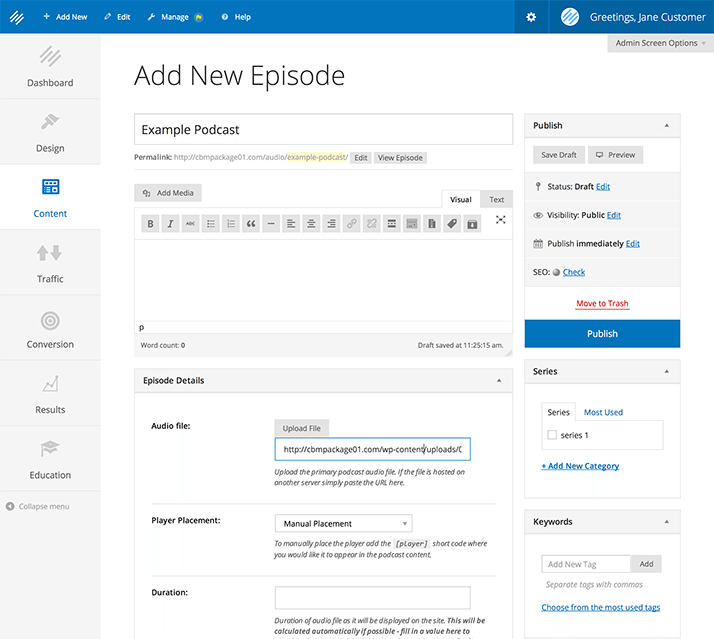
Sometimes it’s great to find a tool that collects a large number of content marketing resources all in one place. The tools mentioned here offer a multitude of services like analytics, list-building, content creation, and more.
Blogger Chris Brogan recently switched his site over to the Rainmaker platform (pictured above), and here’s a bit behind the reason why:
Within Rainmaker, I can create all different types of content, like private membership forums, podcasts, and more. It’s just push-button simple to get most things started, and I’ve enjoyed exploring how each of these can work towards improving business with conversion stats, and the like. That’s the other part I like. I like really simple analytics. Truth is, I’m not clever enough to do much with more complex ones.
Image creation

We’re happy to get some use out of each of these image creation tools now and again, and we know they’ve been really useful for other bloggers as well. Share as Image lets you turn any text into a beautiful image or quote. Skitch is a favorite of ours when it comes to annotated screenshots. And CloudApp lets you create awesome GIFs of your screen.
Research

For coming up with ideas on what to write about (and how to craft a headline), it can be quite useful to look at the most popular content from a given topic (BuzzSumo), from a given website (QuickSprout), or for a particular audience (Quora).
Blogger Gregory Ciotti, who works on growth at Help Scout, Organization
Creating an editorial calendar or collecting notes and ideas in a consistent place can be a huge help for content marketing teams (and individuals, for that matter). Tools like the above can help writers work together and share in a seamless way.
Optimization

For SEO optimization and on-page adjustments, there are a great number of tools that can help with keywords, titles, layout, and readability.
Blogger and entrepreneur Neil Patel found great use with CrazyEgg in optimizing the readability of his blog posts.
Have you wondered how many people actually read your blog posts? With my blog at Quick Sprout, it used to be 40%…until I started using Crazy Egg.
With a few simple Crazy Egg tests, I was able to see how many visitors scrolled down and actually read each blog post. With a bit of testing, I was able to increase the number of people who read each post by 62.5%.
List-building and lead generation
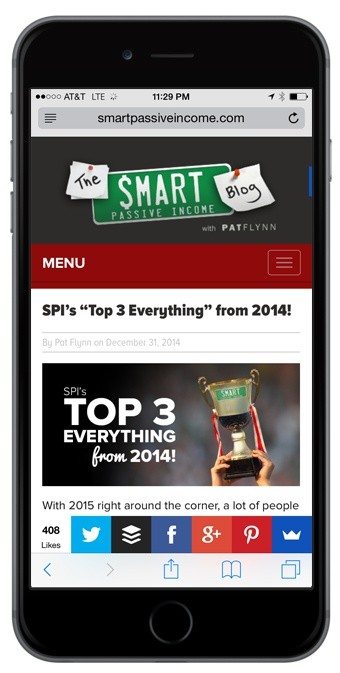
Getting people to take action on your website is often a key goal for content marketers. Often, the action is to join an email list or enter information or follow on social media. The tools listed here offer some great solutions for adding opt-in forms and CTAs to your blog.
Pat Flynn, blogger at Smart Passive Income, predicted SumoMe to be one of his most-used apps in 2015.
There’s also an image sharer function, list building tools, a heat map tool, contact forms, a “smart bar” tool, analytics, and a highlighter tool which allows people to highlight portions of your blog posts, and easily share that. Obviously a great price (free!), but also super easy to install, and useful too!
Summary
What are your favorite content marketing tools that you use on a daily basis?
We’re always eager to learn more about what tools work best for others. There are a ton of great ones out there, and it’s been fun to collect a big list of them here in this blog post. To recap, here are the ones that we use most frequently on the Buffer content team.
- Trello
- WordPress
- Buffer
- Hipchat + Zapier
- Canva
- MailChimp
- Google Analytics
- Feedly
I’d love to hear which tools would make your list! Feel free to share in the comments.
Image sources: The Noun Project, Blurgrounds, Unsplash, Rainmaker, Quick Sprout, Smart Passive Income
Try Buffer for free
190,000+ creators, small businesses, and marketers use Buffer to grow their audiences every month.




